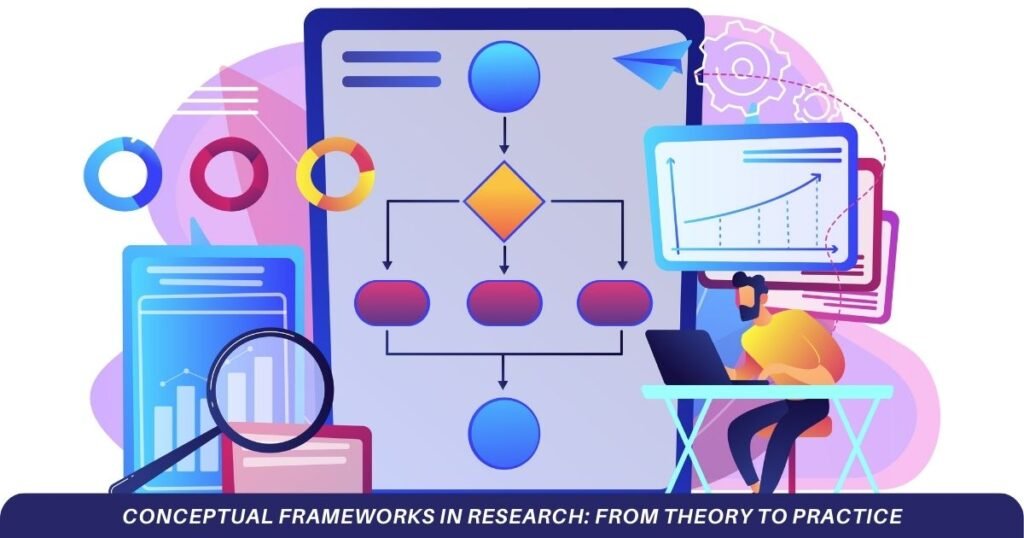
Introduction
A conceptual framework in research is like a roadmap guiding your study. It is the skeleton that supports your ideas and helps you make sense of the puzzle. Imagine it as a blueprint that structures your research and ensures that each piece fits perfectly. This framework is not just a formality; it is the backbone ensuring your study stands strong. Defining key concepts and relationships brings clarity to the chaos, making your research more organized and reliable. In simpler terms, it is the foundation of your research home, ensuring that it stands tall and sturdy amidst the academic landscape. Without this, you risk wandering aimlessly in the research wilderness. This blog will provide basic and detailed information that will definitely help you with your work.
Literature Review
A literature review is like a treasure hunt before you start a building. This is where you dig into existing studies and gather all the golden nuggets of knowledge. Picture it as a friendly detective work, where you explore what others have uncovered in your research neighborhood. By reviewing articles and books, you can create a detailed map of what is already known. This is not just about listing facts; it is also about spotting gaps and understanding the terrain. In simple terms, a literature review is your intention gathering mission, helping you figure out where your research fits in the grand scheme, ensuring your work is not duplicating efforts but adding something new.
Theoretical Framework
A theoretical framework is your research map, which guides you through every corner of the objectives. It is crucial because it is like having a wise friend who helps you interpret your findings. Think of it as the lens through which you view and understand your data. To make it good, be clear about your research questions and logically connect your chosen theories. Imagine building a sturdy bridge between what you know and what you want to discover. Your framework should make sense and support the structure of your study. In simple terms, a strong theoretical framework ensures that you do not get lost in the research maze; it keeps you on a clear path towards meaningful insights.
Research Methodology
Research methodology is a blueprint for scientific exploration. It outlines how you will gather and analyze the data, ensuring the reliability of the study. This framework details the tools, techniques, and procedure used to answer research questions. It is like a recipe for your study that specifies the ingredients and cooking steps. A robust methodology enhances the credibility of findings, making research a solid contribution to knowledge. Clear and transparent, it paves the way for others to replicate or build upon their work. In essence, the research methodology is a systematic plan that turns curiosity into credible and valuable insights.
Hypotheses or Research Questions
The hypotheses are like educated guesses in research, stating what you expect to find. They are adventurous predictions that guide your exploration. On the other hand, the research questions are curious detectives, probing into the unknown. These questions steer your study, unravel mysteries, and unveil insights. Crafting good hypotheses requires clear expectations, whereas research questions demand a knack for exploration. Together, they form the dynamic duo shaping your research journey, one predicting, and the other questioning. It is like having a roadmap; questions and signposts; hypotheses- making sure your research adventure is purposeful and rewarding.
Data Analysis and Interpretation

Data analysis is a systematic examination of the gathered information to extract meaningful patterns and insights. It involves organizing, cleaning, and scrutinizing the data to draw valid conclusions. Once the data is processed, interpretation comes into play – making sense of the findings in relation to the research questions. It is about deriving significance from numbers and identifying trends or relationships. Effective data analysis and interpretation are pivotal for turning raw data into actionable knowledge, offering valuable implications for further research and practical applications. This analytical process connects the collected information to informed decision-making and a deeper understanding of the studied phenomena.
Conclusion
Conceptual frameworks, literature reviews, hypotheses, and data analyses illuminate the intricate path of academic exploration. Just as a well-constructed building requires a solid foundation, a robust research endeavor requires thoughtful planning and execution. Each of the elements discussed serves as a crucial brick in the construction of meaningful knowledge. As we navigate this landscape, let us appreciate the synergy between these components, acknowledging their collective role in unravelling the mysteries of the unknown. These insights empower researchers to embark on their quests with clarity, purpose, and conviction that every question asked contributes to the ever-expanding tapestry of human understanding.
What is a conceptual framework in research?
A conceptual framework is a structure that outlines key concepts and their relationships. It acts as a roadmap, providing clarity and organization for research endeavors.
Why is a literature review essential in research?
A literature review is crucial, as it surveys existing studies and offers insights into what is already known. It helps identify gaps, avoids duplication, and provides a foundation for building new knowledge.
What roles do the hypotheses play in research?
Hypotheses are predictions that guide the research. They articulate the expected outcomes and serve as testable statements by adding a predictive element to the investigative process.
How does data analysis contribute to research?
Data analysis involves systematically examining collected information and extracting meaningful patterns. It transforms raw data into actionable knowledge and, coupled with interpretation, forms the basis for drawing valid conclusions in research.
What is a Conceptual Framework in Research?
A conceptual framework is a structured plan or diagram that researchers use to organise their ideas and theories. It serves as a guide for their study, helping them clearly define and link different concepts and variables relevant to their research.
Can You Provide an Example of a Conceptual Framework?
An example of a conceptual framework might involve studying the impact of social media on youth wellbeing. The framework includes key concepts, such as social media usage, mental health, and social behavior, and illustrates the hypothesized relationships between them.
How is a Conceptual Framework Used in Quantitative Research?
In quantitative research, a conceptual framework is used to hypothesize the relationships between variables. It helps formulate and test hypotheses using statistical methods to analyze numerical data.
What Role Does a Conceptual Framework Play in Qualitative Research?
In qualitative research, a conceptual framework guides the exploration of complex phenomena using nonnumerical data. It helps to understand the patterns, themes, and deeper meanings of the research subject.
Can You Share a Sample Conceptual Framework in Qualitative Research?
A sample conceptual framework in qualitative research could explore the cultural factors influencing educational choices in a specific community. It maps out key cultural beliefs, societal norms, and individual aspirations and their interconnections.
Why is a Conceptual Framework Important in Research?
A conceptual framework is crucial because it provides a clear roadmap for research. It helps in defining the scope, focusing the study, and ensuring that the research questions, methodology, and analysis are aligned.
How is a Conceptual Framework Developed in a Thesis?
In this thesis, a conceptual framework is developed by reviewing the relevant literature, identifying key theories and concepts, and logically organizing these elements to address the research problem or hypothesis.
What Distinguishes a Conceptual Framework from a Theoretical Framework in Research?
While a conceptual framework is a specific plan created for a research project that outlines its key concepts and their relationships, a theoretical framework involves broader theories and principles that underpin the study. The theoretical framework provides a general perspective, whereas the conceptual framework offers a focused and practical approach to research.
How Does a Conceptual Framework Enhance Qualitative Research?
In qualitative research, a conceptual framework enhances understanding by providing a structured approach to interpreting the subjective, detailed data collected. It helps identify and analyze patterns and themes in the context of the study.
What are the Key Components of a Conceptual Framework in Research?
The key components of a conceptual framework include the research question, hypotheses (if applicable), variables, and the presumed relationships between these variables. It also encompasses the underlying assumptions and theories that guide the study.
How Can One Create a Conceptual Framework for Their Research?
To create a conceptual framework, we begin by conducting a thorough literature review to understand existing theories and findings related to the topic. Identify key variables and concepts and then logically organise them to reflect the relationships and processes that you aim to explore or test in your research.
Relevant Articles
